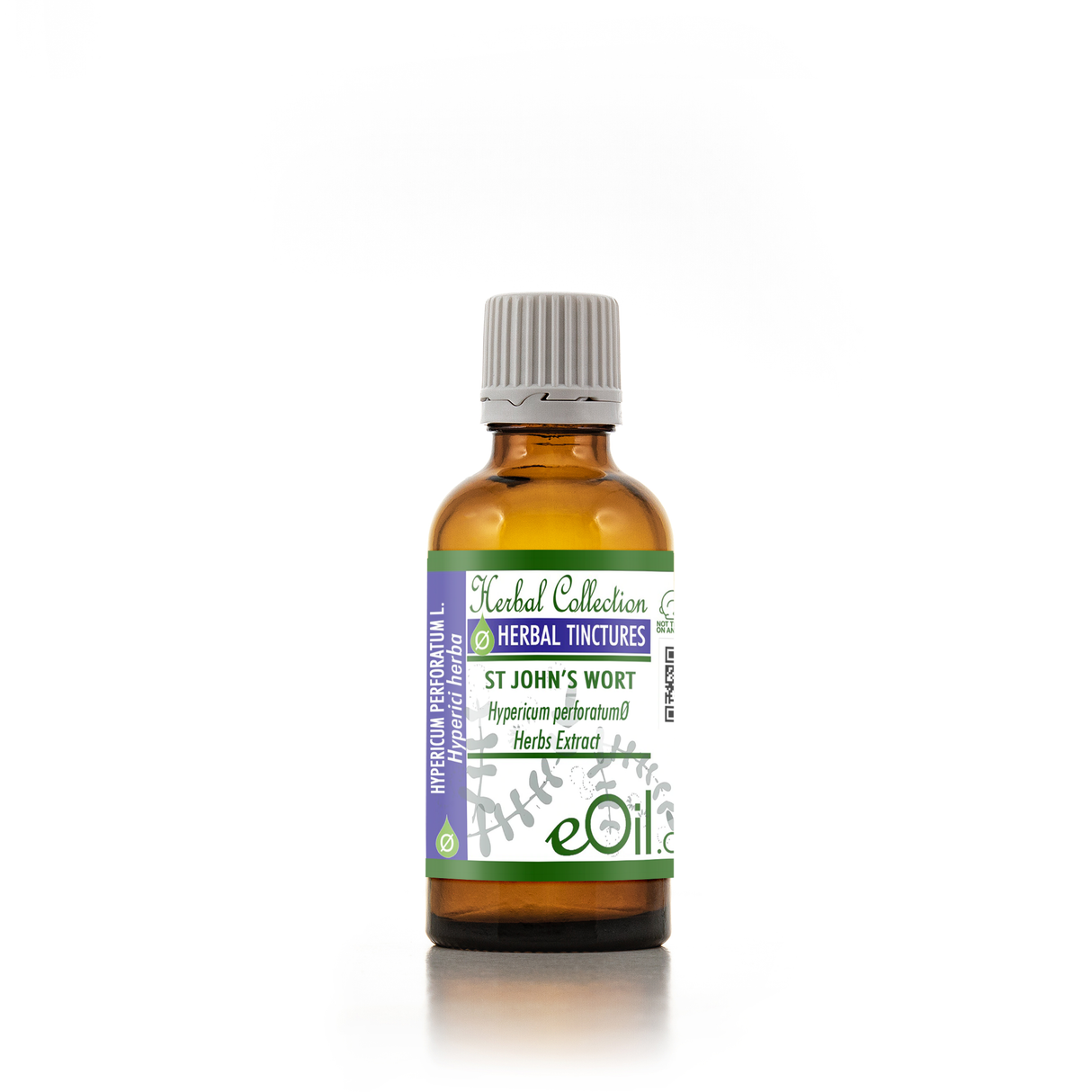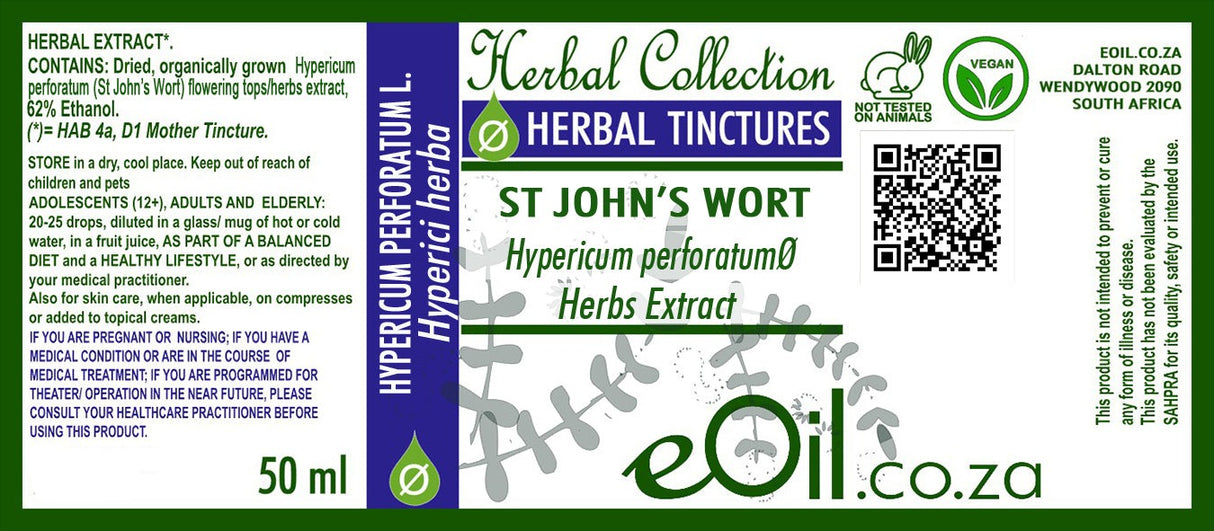St John's Wort Liquid Herbal Extract
St John's Wort Liquid Herbal Extract - 50 ML is backordered and will ship as soon as it is back in stock.
Description
Description
Understanding Mother Tinctures & Glycerines
St John's Wort Liquid Herbal Extract tincture (Hypericum perforatum) is a pure, plant-based supplement traditionally valued for supporting emotional balance and nervous system wellness.
Known for promoting positive mood and natural resilience, this additive-free tincture is ideal for daily wellness routines. Vegan-friendly and easy to use in water or juice.
TRADITIONALLY USES
Internal Uses
- Mood Support: Much like the tisane, St. John's Wort tincture was a popular remedy for mild to moderate cases of depression, anxiety, and general low spirits. It was believed to promote emotional balance.
- Nerve Calming: The tincture was used to ease nervous tension, restlessness, and sleep disturbances associated with anxiety.
- Digestive Support: Some traditional uses include St. John's Wort tincture to soothe digestive issues and support overall gut health.
External Uses (use macerated st john's wort for this purpose)
- Wound Healing: macerated st john's carrier oil has a long history of topical application to aid in the healing of cuts, burns, bruises, and skin inflammation. Its potential antiseptic and anti-inflammatory properties were valued.
- Muscle and Nerve Pain: macerated st john's carrier oil applied topically to help relieve muscle aches, joint pain, and nerve-related discomfort.
Traditional Preparation and Dosage
St. John's Wort tincture is created by extracting the medicinal components of the plant (often the flowering tops) into alcohol. Traditional dosages vary, and it's crucial to consult with a qualified healthcare professional for personalized guidance.
Important Considerations:
- Drug Interactions: St. John's Wort can significantly interact with several medications, including antidepressants, birth control, and blood thinners. Thoroughly discuss potential interactions with your doctor before use.
- Sun Sensitivity: The tincture, like the tisane, may make your skin more sensitive to sunlight. Practice sun protection measures.
- Pregnancy and Breastfeeding: St. John's Wort is generally not recommended during pregnancy or breastfeeding.
- Not a Cure-All: Always seek professional medical advice. Traditional remedies should not replace necessary medical treatment.
INFORMATION
Source : http://www.wikiphyto.org/wiki/St John's Wort
Reference on http://www.wikiphyto.org
Translation in English by Google Translate (go to the page of the source linked | on Chrome cellphones go on the 3 dots on the top right and select translate in your preferred language | on laptop right click your mouse and select option translate when hoovering on the page
plant name
St. John's wort, St. John 's wort, perforated St. John's wort , St John's wort (English)
International Latin denomination
botanical family
Clusiaceae (= Guttiferaceae = Hypericaceae)
Description and habitat
- Herbaceous plant of Eurasian origin, perennial, erect angular stem, branching
- Up to 80 cm high
- Oval leaves, opposite and punctuated with black on the edges ( hypericin secretory pockets ), presenting on their surface numerous small translucent essence pockets, visible by transparency as small perforations, justify its name (the adjective “perforated” is therefore a pleonasm)
- Bright yellow flowers grouped in panicles
- The plant is currently cultivated in many temperate regions of the world to meet very high demand.
History and tradition
- One of the flowers of Saint John
- Was used in the manufacture of "tranquil balm" and nowadays "Commander's balm" because of its vulnerary properties, in the Middle Ages, treated cases of dementia
- Associated with solar cults for two reasons: flowering at St Jean, and bright red coloring of the oily macerate of the flowers after exposure to light for several weeks
- We only find mention of its antidepressant properties from the 1960s in Germany, where it was extensively studied, with numerous pharmacological and clinical studies.
- Decision of January 22, 2001 published in the Official Journal of January 27, 2001: any magistral preparation of St. John's Wort, even homeopathic, must include the following statement on the packaging: “warning, risk of drug interaction. The combination of this preparation of St. John's wort with other drugs can lead to a reduction in their effectiveness. Conversely, a sudden interruption of the intake of St. John's wort can increase the toxicity of these drugs. Ask your doctor or pharmacist."
Parts used
- Flowering tops harvested in summer
Dosage forms available
- Whole plant tincture
- Hydro-alcoholic dry extract titrated in hypericin and/or hyperforin (the most active)
- whole plant EPS
- Fluid extract
Usual dosages
- 600 mg per day of dry extract titrated to 0.2% minimum hypericin or equivalent galenic forms
- Corresponds to 2-4 g of drug, 0.2-1 mg of hypericin
- A mother tincture contains on average 5 mg of hypericin per 100 ml, which corresponds, for a daily dose of 3 times 20 drops (= 3 ml), to a quantity of 0.15 mg of hypericin
- In general 2 to 3 doses per day (i.e. 1 mg to 3 mg maximum of total hypericins )
- Minimum dose of hypericin for activity: 0.6 to 1 mg/day
Composition
Main components of the plant
- Red pigments from the group of anthrones (0.06-0.15%): naphthodianthrones including hypericin (usual tracer of extracts), pseudohypericin , isopseudohypericin , protopseudohypericin , and cyclopseudohypericin
- Phloroglucinol -derived phenolic compounds (2-5%): hyperforin (prenylated derivative), adhyperforin , hydroperoxycadiforin (best candidate for antidepressant effect)
- Flavonoids : hyperoside , isoquercitroside , rutoside , quercetol
- Biflavonoids (0.1-0.5%): biapigenin , amentoflavone (its isomer)
- Xanthones in small quantities: tetrahydroxyxanthone (and kielcorine in the roots)
- Tannins and proanthocyanidins
- Essential oil : n - alkanes and monoterpenes
- Melatonine (4490 ng/g) [1]
Main components of buds or young shoots
Main components of essential oil
- Methyl-2-octane (main component, approximately 50%), n-nonane , n-undecane
- Alpha-pinene , beta-pinene , limonene , myrcene , caryophyllene , alpha-terpineol , geraniol , caprylic ( n-octanal ) and capric ( n-decanal ) aldehydes [2]
Properties
Plant properties
- Antidepressant, the activity is linked to an inhibition of the reuptake of neuromediators (especially serotonin, dopamine, norepinephrine) and a moderate interaction with GABA -A receptors ( hyperforin especially), [3] , [4] , [5 ] , [6] , [7] , [8] , [9] , [10] , hyperforin would be the most serious candidate, but the antidepressant effect is probably due to a synergy between different substances [11] , [12]
- Anxiolytic [13] , [14]
- Sedative [15] even with extracts lacking hyperforin
- Many molecules are synergistic with each other, by two complementary mechanisms:
- Pharmacodynamic synergy, where components have effects on the same targets or multi-target effects: hypericin , flavonols and xanthones inhibit monoamine oxidase MAO and catechol-O-methyltransferase COMT, hyperforin inhibits serotonin reuptake
- Pharmacokinetic synergy, which affects the absorption, distribution, biotransformation, or elimination of molecules: procyanidin increases the water solubility of naphthodianthrones, therefore their bioavailability [16]
- Hydro-alcoholic extracts are selective inhibitors of type A mono-amine oxidase (MAO) by flavonoids and xanthones (which would nevertheless be present in too small quantities), inhibition of catechol-O-methyl transferase [17]
- Hypericin has weak activity (preparations lacking it are active) but it binds to receptors for the Y1 and Y2 neuropeptides, thought to play a role in anxiety and depressive states. Naphthodianthrones are very reactive in the presence of light and they are the ones that provide the red color of the oil
- Flavonoids are also catechol-o-methyltransferase (COMT) inhibitors , but studies show too little activity in this regard and in the inhibition of MAO
- Amentoflavone binds to the benzodiazepine receptor
- Hypericin is sedative and melatonergic
- Hypericin may fight cytomegalovirus (CMV) and herpes simplex [ 18]
- Neuroprotecteur [19]
- Hyperoside acts on human brain tumors
- Hyperforin induces inhibition of tumor growth of leukemia cells, cerebral glioblastoma cells, synergistically with hypericin and procyanidin B2, activation of caspases, induction of apoptosis [20]
- Serotonergic and melatonergic (causes an increase in melatonin levels)
- Modest activity against behavioral stressors [21]
- St. John's wort powder-based products for oral consumption, sold without medical prescription, are currently marketed in France illegally
- In the fresh plant, naphthodianthrones exist in proto- or precursor form ( protohypericin ), protohypericin is much weaker phototoxic
- Anti-inflammatory and analgesic [22]
- Cholagogue, digestive
- Anti-asthmatic?
- Externally: antiseptic, astringent, healing, vulnerary, especially in the form of oily maceration [23]
- Usable in the treatment of inflammatory periodontal disease, inhibits plasma extravasation and decreases bone resorption [24]
- Hypericin can be an agent for photo-detection and dynamic phototherapy of ovarian cancer micrometastases [6]
- Hypericum lanceolatum has antimalarial properties [25]
Bud properties
Properties of essential oil
- Anti-inflammatory
- Potential anti-angiogenic properties [26]
Indications
Indications of the whole plant (phytotherapy)
- Depressive states (mild to moderate depression), especially seasonal depression, and occurring during nervous fatigue and physiological states such as menopause
- A meta-analysis [27] in 1996 reported the results of 27 trials (out of 1757 patients in all) comparing St. John's wort either with a placebo or with active treatments. It suggests that St. John's wort is more effective than a placebo and as effective as low-dose tricyclic antidepressants (TCAs) in treating depression. Its mechanism of action seems similar to that of classic antidepressants: inhibition of the reuptake of monoamines
- A double-blind trial of 324 patients with mild to moderate depression treated with a 0.2% alcoholic extract of hypericin showed identical efficacy to 50 mg imipramine twice daily [28] , another study showed the same efficacy as imipramine, with better tolerance [29]
- Similar efficacy to IRS (serotonin reuptake inhibitors) in a meta-analysis [30]
- It was observed, in patients treated with an extract of St. John's wort, a significant reduction in the Hamilton score (initial evaluation scale of depression) compared to patients treated with paroxetine, with improvement in the severity score of depression and better medium-term remission [31]
- Efficacy and good tolerance [32]
- No positive effects should be expected before 10 - 14 days of treatment
- Stop if no effect has appeared after 4 to 6 weeks of treatment
- According to the experience of clinicians, the effectiveness is clearer in winter-like depression (action on melatonin?)
- Wounds and burns, sunburn (external route)
Indications of the bud (gemmotherapy)
Specific indications of essential oil (aromatherapy)
Known or suspected mode of action
- The pharmacological activity seems to be attributable to a synergy between naphthodianthrones ( hypericin ), phloroglucinol derivatives ( hyperforin ) and different flavonoids [33].
- Kielcorine ( xanthone ) would be one of the active principles
- St. John's wort is a source of melatonin (Pr Robert Anton)
- Mechanism of action: St. John's wort inhibits synaptosomal reuptake of serotonin, dopamine, and norepinephrine (norepinephrine) with equal affinity
- Also in vitro, it shows affinity for adenosine, GABA (A) and (B) and glutamate receptors
- In vivo it exerts a decrease in beta-adrenergic activity at the level of its receptors and an increase in the activity of serotonin
Usual formulations
- Dry extracts in capsules or tablets, dosed between 200 and 300 mg per capsule
- Take 600 to 900 mg per day
- Preparation of St. John's wort oil : macerate a good handful of St. John's wort flowers in ¾ liter of olive oil (in a wide-necked container). Leave the bottle closed, in direct sunlight, for three weeks: the oil gradually takes on a beautiful red color. Attention, it is photosensitizing, it should not be used before sun exposure, only in burns or sunburn
Regulations
- French Pharmacopoeia list A (flowering top)
- Activity recognized by the German Commission E
Possible side effects and precautions for use
- Photosensitizing (by induction of singlet O2 formation)
- Interactions [34] with "low therapeutic margin" drugs, including anti-retrovirals (anti-HIV such as indinavir [35] ), digoxin, theophylline, vitamin K antagonists, ciclosporin, contraceptives oral, SSRI antidepressants, amitriptyline, cyclosporine, fexofenadine, indinavir, methadone, midazolam, nevirapine, phenprocoumon, simvastatin, tacrolimus and warfarin. These interactions are linked to enzymatic induction of cytochrome P450 and induction of membrane glycoprotein P [36].
- Possible reduction of drug effect secondary to decreased plasma concentration, as a result of possible induction of CYP2C9 isoenzyme, CYP3A4 and CYP1A2 [37] , [38] , induction of CYP3A activity , with reduced therapeutic efficacy of drugs metabolized by CYP3A, other sources do not find any alteration in the activity of CYP2C9, CYP1A2, CYP2D6 [39]
- Interactions with protease and transcriptase inhibitors, immunosuppressants ciclosporin and tacrolimus, irinotecan, imatinib, low-dose hormonal contraceptives, serotonergic antidepressants by induction of cytochrome P450 CYP3A4 ( hyperforin ) and P-glycoprotein ( hypericin ) [40]
- A sudden interruption of the intake of St. John's wort can therefore also lead to an increase in the plasma concentration of these drugs.
- St. John's wort gradually and powerfully induces the activity of CYP3A4, the elimination of ethinylestradiol, a major substrate of CYP3A4, will be greatly accelerated in the presence of St. John's wort, therefore the contraceptive effect will no longer be assured and another method of contraception [41]
- In 2014, the MHRA (Medicines and Healthcare Products Regulatory Agency) issued an alert on the risk of interaction between St. John's wort and hormonal contraceptives containing progesterone, microdose combination pills and etonogestrel implants: 19 suspicious interactions were reported between 2000 and 2014, including 15 unwanted pregnancies [42]
- Hyperforin is presumably the main culprit of the interactions:
- It has been shown that the hyperforin content of a St. John's wort preparation is significantly correlated with the level of CYP3A4 induction [43].
- A low- hyperforin Hypericum extract was studied in 20 healthy volunteers receiving a drug cocktail, and no pharmacokinetic interactions were observed for CYP1A2, CYP2B6, CYP2C9, CYP2C19, CYP3A4 and P-glycoprotein [44].
- A few cases of serotonin syndrome have been reported in the literature in elderly patients treated with a serotonin reuptake inhibitor antidepressant and having taken St. John's wort.
- Good job security otherwise [45]
- The essential oil can be allergenic
Bibliographic references
- Go↑ Meng X, Li Y, Li S, Zhou Y, Gan RY, Xu DP, Li HB. Dietary Sources and Bioactivities of Melatonin. Nutrients. 2017 Apr 7;9(4). pii: E367. doi: 10.3390/nu9040367.
- Go↑ Mathis, C & Ourisson, G. (1964). Chemo-taxonomic study of the genus Hypericum II. Identification of constituents of various essential oils of Hypericum. Phytochemistry. 3. 115-131. 10.1016/S0031-9422(00)84003-0.
- Go↑ Linde K, Ramirez G, Mulrow CD, Pauls A, Weidenhammer W, Melchart D - St John's wort for depression - an overview and meta-analysis of randomised clinical trials. - BMJ 1996 Aug 3;313(7052):253-258. PMID 8704532 [1]
- Go↑ Lecrubier Y., Clerc G., Didi R., Kieser M. Efficacy of St. John’s Wort Extract WS 5570 in major depression: A double-blind, placebo-controlled trial. Am J Psychiatry 2002; 159:1361-1366. PMID 12153829
- Go↑ Knuppel L, Linde K. Adverse effects of St. John's Wort: a systematic review. J Clin Psychiatry. 2004 Nov;65(11):1470-9. PMID 15554758
- Go↑ Laakmann G, Schüle C, Baghai T, Kieser M - St John's wort in mild to moderate depression: the relevance of hyperforin for the clinical efficacy - Pharmacopsychiatry 1998; 31 (1): 54-59. PMID 9684948
- Go↑ Whiskey E, Werneke U, Taylor D - a systematic review and meta-analysis of Hypericum perforatum in depression : a comprehensive clinical review - Intern Clin Psychopharmacology 2001; 16: 239-252. PMID 11552767
- Go↑ Linde K., Berner M., Egger M., and Mulrow C. - St John's wort for depression: Meta-analysis of randomised controlled trials - Br. J. Psychiatry, February 1, 2005; 186(2): 99 - 107. PMID 15684231
- Go↑ Linde K. St. John's wort - an overview. Forsch Komplementmed. 2009 Jun;16(3):146-55. PMID 19657198
- Go↑ Szegedi A, Kohnen R, Dienel A, Kieser M. Acute treatment of moderate to severe depression with hypericum extract WS 5570 (St John's wort): randomised controlled double blind non-inferiority trial versus paroxetine. BMJ. 2005 Mar 5;330(7490):503. doi: 10.1136/bmj.38356.655266.82. Epub 2005 Feb 11. Erratum in: BMJ. 2005 Apr 2;330(7494):759. Dosage error in article text. PMID 15708844; PMCID: PMC552808. texte intégral
- Go↑ Potherat JJ and Fontanel D. Folder St. John's Wort, in the Letter of Phytotherapy. No. 2 - 3rd quarter 2007.
- Go↑ Barnes J, Anderson LA, Phillipson JD. St John's wort (Hypericum perforatum L.): a review of its chemistry, pharmacology and clinical properties. J Pharm Pharmacol. 2001 May;53(5):583-600. PMID 11370698
- Go↑ Beijamini V, Andreatini R. Effects of Hypericum perforatum and paroxetine on rat performance in the elevated T-maze. Pharmacol Res. 2003 Aug;48(2):199-207. PMID 12798673
- Go↑ Flausino OA Jr, Zangrossi H Jr, Salgado JV, Viana MB. Effects of acute and chronic treatment with Hypericum perforatum L. (LI 160) on different anxiety-related responses in rats. Pharmacol Biochem Behav. 2002 Jan-Feb;71(1-2):251-7. PMID 11812530
- Go↑ Coleta M, Campos MG, Cotrim MD, Proença da Cunha A. Comparative evaluation of Melissa officinalis L., Tilia europaea L., Passiflora edulis Sims. and Hypericum perforatum L. in the elevated plus maze anxiety test. Pharmacopsychiatry. 2001 Jul;34 Suppl 1:S20-1. PMID 11518069
- Go↑ Spinella, M. (2002). The importance of pharmacological synergy in psychoactive herbal medicines. Alternative Medicine Review, 7(2), 130-137. PMID 11991792
- Go↑ Bennett DA Jr, Phun L, Polk JF, Voglino SA, Zlotnik V, Raffa RB. Neuropharmacology of St. John's Wort (Hypericum). Ann Pharmacother. 1998 Nov;32(11):1201-8. PMID 9825087
- Go↑ Bézanger-Beauquesne L, Pinkas M, Torck M, Trottin F. Medicinal plants of temperate regions. Ed. Maloine. Paris. 1980. p. 141.
- Go↑ Oliveira AI, Pinho C, Sarmento B, Dias AC. Neuroprotective Activity of Hypericum perforatum and Its Major Components. Front Plant Sci. 2016 Jul 11;7:1004. doi: 10.3389/fpls.2016.01004. eCollection 2016. PMID 27462333
- Go↑ Hostanska K, Reichling J, Bommer S, Weber M, Saller R. Hyperforin a constituent of St John's wort (Hypericum perforatum L.) extract induces apoptosis by triggering activation of caspases and with hypericin synergistically exerts cytotoxicity towards human malignant cell lines. Eur J Pharm Biopharm. 2003 Jul;56(1):121-32. PMID 12837490
- Go↑ Kumar A, Garg R, Prakash AK. Effect of St. John's Wort (Hypericum perforatum) treatment on restraint stress-induced behavioral and biochemical alteration in mice. BMC Complementary and Alternative Medicine 2010. [2]
- Go↑ Kumar V, Singh PN, Bhattacharya SK. Anti-inflammatory and analgesic activity of Indian Hypericum perforatum L. Indian J Exp Biol. 2001 Apr;39(4):339-43. PMID 11491578
- Go↑ Süntar, I., Akkol, E. K., Keleş, H., Oktem, A., Başer, K. H. C., & Yeşilada, E. (2011). A novel wound healing ointment: A formulation of Hypericum perforatum oil and sage and oregano essential oils based on traditional Turkish knowledge. Journal of Ethnopharmacology, 134(1), 89–96. https://doi.org/10.1016/J.JEP.2010.11.061
- Go↑ Paterniti I, Briguglio E, Mazzon E, Galuppo M, Oteri G, Cordasco G, Cuzzocrea S. Effects of Hypericum Perforatum, in a rodent model of periodontitis. BMC Complementary and Alternative Medicine 2010, 10:73 (23 November 2010) [3]
- Go↑ Zofou D, Kowa TK, Wabo HK, Ngemenya MN, Tane P, Titanji VP. Hypericum lanceolatum (Hypericaceae) as a potential source of new anti-malarial agents: a bioassay-guided fractionation of the stem bark. Malaria Journal. 2011;10:167. doi:10.1186/1475-2875-10-167. texte intégral
- Go↑ Kıyan HT, Demirci B, Başer KH, Demirci F. The in vivo evaluation of anti-angiogenic effects of Hypericum essential oils using the chorioallantoic membrane assay. Pharm Biol. 2014 Jan;52(1):44-50. doi: 10.3109/13880209.2013.810647. PMID 24044783
- Go↑ Linde K, Mulrow CD. St. John’s Wort for Depression (Cochrane Review). In : The Cochrane Library, Issue 3, 2000. Oxford : Update Software. http://onlinelibrary.wiley.com/o/cochrane/clsysrev/articles/CD000448/frame.html
- Go↑ Vorbach EU, Arnoldt KH, Hubner WD: Efficacy and tolerability of St. John's wort extract LI 160 versus Imipramine in Patients with Severe Depressive Episodes According to ICD-10. Pharmacopsychiatry. 1997 Sep;30 Suppl 2:81-85.
- Go↑ Woelk H : comparison of St John’s wort and imipramine for treating depression : A randomised controlled trial. Br Med J, septembre 2000 ; 321 : 536-9. PMID 10968813
- Go↑ Ng QX, Venkatanarayanan N, Ho CY. Clinical use of Hypericum perforatum (St John's wort) in depression: A meta-analysis. J Affect Disord. 2017 Mar 1;210:211-221. doi: 10.1016/j.jad.2016.12.048. PMID 28064110.
- Go↑ Seifritz E, Hatzinger M, Holsboer-Trachsler E. Efficacy of Hypericum extract WS(®) 5570 compared with paroxetine in patients with a moderate major depressive episode - a subgroup analysis. Int J Psychiatry Clin Pract. 2016 Sep;20(3):126-32. doi: 10.1080/13651501.2016.1179765. PMID 27161105
- Go↑ Zirak N, Shafiee M, Soltani G, Mirzaei M, Sahebkar A. Hypericum perforatum in the treatment of psychiatric and neurodegenerative disorders: Current evidence and potential mechanisms of action. J Cell Physiol. 2019 Jun;234(6):8496-8508. doi: 10.1002/jcp.27781. PMID 30461013.
- Go↑ Butterweck V. Mechanism of action of St John's wort in depression : what is known? CNS Drugs. 2003;17(8):539-62. PMID 12775192
- Go↑ Russo E, Scicchitano F, Whalley BJ, Mazzitello C, Ciriaco M, Esposito S, Patanè M, Upton R, Pugliese M, Chimirri S, Mammì M, Palleria C, De Sarro G. Hypericum perforatum: pharmacokinetic, mechanism of action, tolerability, and clinical drug-drug interactions. Phytother Res. 2014 May;28(5):643-55. doi: 10.1002/ptr.5050. PMID 23897801
- Go↑ Piscitelli SC, Burstein AH, Chaitt D, Alfaro RM, Falloon J. Indinavir concentrations and St John's wort. Lancet. 2000 Feb 12;355(9203):547-8. PMID 10683007
- Go↑ Zhou S, Chan E, Pan SQ, Huang M, Lee EJ. Pharmacokinetic interactions of drugs with St John's wort. J Psychopharmacol. 2004 Jun;18(2):262-76. PMID 15260917
- Go↑ Natural health products, to better advise patients. Reference document of the College of Physicians and the Order of Pharmacists of Quebec, 2004.
- Go↑ Obach RS. Inhibition of human cytochrome P450 enzymes by constituents of St. John's Wort, an herbal preparation used in the treatment of depression. J Pharmacol Exp Ther. 2000 Jul;294(1):88-95. PMID 10871299
- Go↑ Wang Z, Gorski JC, Hamman MA, Huang SM, Lesko LJ, Hall SD. The effects of St John's wort (Hypericum perforatum) on human cytochrome P450 activity. Clin Pharmacol Ther. 2001 Oct;70(4):317-26. PMID 11673747
- Go↑ Mannel M. Drug interactions with St John's wort : mechanisms and clinical implications. Drug Saf. 2004;27(11):773-97. PMID 15350151
- Go↑ Center for Therapeutic Information and Pharmacovigilance, Department of Clinical Pharmacology and Toxicology, University Hospitals, Geneva [4]
- Go↑ St John’s wort: interaction with hormonal contraceptives, including implants (St John’s wort interacts with hormonal contraceptives reducing the effectiveness and increasing the risk of unplanned pregnancy). Medicines and Healthcare products Regulatory Agency. Published 12 March 2014 [5]
- Go↑ Nicolussi, S, Drewe, J, Butterweck, V, Meyer zu Schwabedissen, HE. Clinical relevance of St. John's wort drug interactions revisited. Br J Pharmacol. 2020; 177: 1212– 1226. https://doi.org/10.1111/bph.14936
- Go↑ Zahner, C., Kruttschnitt, E., Uricher, J., Lissy, M., Hirsch, M., Nicolussi, S., Krähenbühl, S. and Drewe, J. (2019), No Clinically Relevant Interactions of St. John's Wort Extract Ze 117 Low in Hyperforin With Cytochrome P450 Enzymes and P‐glycoprotein. Clin. Pharmacol. Ther., 106: 432-440. doi:10.1002/cpt.1392
- Go↑ Peron AP, Mariucci RG, de Almeida IV, Düsman E, Mantovani MS, Vicentini VE. Evaluation of the cytotoxicity, mutagenicity and antimutagenicity of a natural antidepressant, Hypericum perforatum L. (St. John's wort), on vegetal and animal test systems. BMC Complementary and Alternative Medicine 2013, 13:97 (6 May 2013) Abstract Provisional PDF
- Final report on the safety assessment of Hypericum perforatum extract and Hypericum perforatum oil. Int J Toxicol. 2001;20 Suppl 2:31-9. PMID 11558639
- Wong AH, Smith M, Boon HS. Herbal remedies in psychiatric practice. Arch Gen Psychiatry. 1998 Nov;55(11):1033-44. PMID 9819073
- Delini-Stula A, Lorenz J, Holsboer-Trachsler E. Herbal antidepressants. Forum Med Switzerland Nov. 2002 No48, 1146-1154. http://www.medicalforum.ch/pdf/pdf_e/2002/2002-48/2002-48-147.PDF
- Wichtl Max, Anton Robert. Therapeutic plants: Tradition, officinal practice, science and therapy. Ed. Tec & Doc. Cachan. 1999. p. 280
- Weber Wendy; Vander Stoep Ann; McCarty Rachelle L.; Weiss Noel S.; Biederman Joseph; McClellan Jon. Hypericum perforatum (St John's Wort) for Attention-Deficit/Hyperactivity Disorder in Children and Adolescents: A Randomized Controlled Trial. JAMA. 2008;299(22):2633-2641.
- Re L, Corneli C, Sturani E, Paolucci G, Rossini F, León OS, Martínez G, Bordicchia M, Tomassetti Q. Effects of Hypericum extract on the acetylcholine release: a loose patch clamp approach. Pharmacological Research, Volume 48, Issue 1, July 2003, Pages 55-60 [7]
- Boulard Bernard. Medicinal plants of the world. Ed. ESTEM. 2001 p.627
CAUTION
Store in a cool, dry place, away from light. Keep tightly closed, away from the reach of Children and pets.
Do not exceed the daily dose.
This product is not intended to prevent or cure any form of illness or disease.
If you are pregnant or nursing ; If you have a medical condition or are in the course of medical treatment ; If you are programmed for theater/operation in the near future, please consult your healthcare practitioner before using this product.
This product cannot replace a varied and balanced diet and a healthy lifestyle.
This product has not been evaluated by the SAHPRA for its quality, safety or intended use.
For More Information please check our General Safety Herbal products Page

St John's Wort Liquid Herbal Extract - 50 ML is backordered and will ship as soon as it is back in stock.






